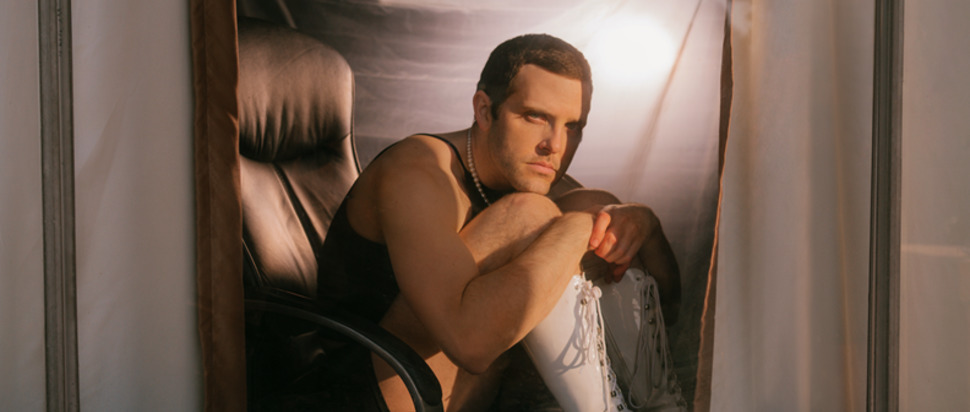Baths, Gut and Queer Melancholy
One writer explores the companionship he's found in Baths' music over the years, catching up with Will Wiesenfeld to discuss new record Gut and queer acceptance
Once, aged nineteen, I headbanged so hard – headphones plugged in, so as to not wake my usually-indignant flatmate – that I whacked my head against the corner of my laptop. When I looked back up at the wall-length mirror in my tiny, overpriced room, I saw blood mapped half my face, from the miniscule cut above my right eye.
The song I was so enraptured in was No Eyes by Baths, aka Will Wiesenfeld, from his 2013 album Obsidian. It was 1am; I was a young queer, living in an unfamiliar city (Dublin). I was single. I was lonely. Ever since then, No Eyes is up there as a song too good to listen to, along with LCD Soundsystem’s american dream and Not What I Needed by Car Seat Headrest – too hot to the touch, like blood over the eye. They conjure an adolescent universe of emotion.
What I find most brutal about No Eyes (a song about seeking casual sex “rooted in apathy,” Wiesenfeld tells me over video call) is the brevity of its intermission. It chugs, relentless as desire, Wiesenfeld’s abrasive topline all howls and yelps, before suddenly pausing with quiet piano. But any reprieve we expect is sucked away with a wave of crashing harsh noise, and we’re back to the inescapable beat. What had come before will persist, again and again, whether we want it to settle or not.
Baths’ music treads this ground constantly. It’s been a companion to me, over the years, through all my questioning, my queer melancholy, my queer ambivalence. Aged nineteen, it was hard to know what the “right” way to be queer was, as if it were possible to be illegitimate in my attraction to men; that I could be discredited. Not enough casual sex, too horny, not horny enough, averse to gay clubs, etcetera. Chronic eczema distorted my body image, made me feel inadequate, failing at twinkdom. Community-making was always a searching. I never felt I could fit. ‘I’m queer in a way that works for you,’ Wiesenfeld sings on Human Bog, getting at the colossus of this expectation. Or this ambivalence towards hook-ups, on 2014 B-side Disorderly: ‘Forgot to thank you for your love / Whatever your name was.’
The lyrics for Human Bog “came all at once," Wiesenfeld says, "[but] disconnected from music… a complete miracle.” There’s a vivid poetics to Wiesenfeld’s lyrics, irrespective of the lush electronic production that accompanies them. Obsidian is full of dark startling gems, apocalyptic turns of phrase like ‘lodged in the rectal wall of agony’, from No Past Lives, or this desperate confession in No Eyes, words which haunted my teenage mind: ‘It is not a matter of / If you mean it / But it is only a matter of / Come and fuck me’.
For so much of this queer melancholy is illogical; it lives in the stomach. Hence Gut. Baths’ latest record is a truly sophisticated achievement, dragging this queer melancholy right to the fore. It’s “all instinctual, uncouth or unfriendly,” Wiesenfeld says, “coming back to the negative feelings I’ve had all my life and allowing them to be said out loud… making a new mess out of that stuff.” Whereas the spoken-word intro for Obsidian conjured a Sheol-like space (‘Birth was like a fat black tongue / Dripping tar and dung and dye / Slowly into my shivering eyes’), ecstatic Gut opener Eyewall telescopes in on a lover: ‘The bedroom where you held me / In the morning, it was sanctioned’. The chorus of several selves comes to the fore on Sea of Men – sassy, demure, sincere, yelping, ‘on their knees’. Homosexuals, meanwhile, features tumbling drums, warped guitar, and a lament: ‘Know that none of how I’ve loved is working’.
The story of the queer body is never done, in Gut. Its closer, The Sound of a Blooming Flower, exemplifies this. With the title taken from “a Björk interview, Vespertine-era,” where she mentions the titular impossible task, the seven-minute epic starts with a quiet piano ballad, before shooting into the stratosphere with maximalist glee like an anime theme on poppers. “So much of that song is tied into the weight of a Christian childhood," Wiesenfeld explains, "to thinking that certain things have to be a certain way,” something also reflected in the song Cedar Stairwell, where ‘our parents pause to see us through the glassware. For Wiesenfeld, Gut dramatises “the tandem nature of my slow abandonment” of these expectations, even though “it’s always messy. I still feel there is this lingering philosophy of Christianity somewhere in my brain that hinders me from being 100% of the person I want to be.” The Sound of a Blooming Flower is “not ending the album on a positive note,” Wiesenfeld says, “so much as acceptance.”
As queer people, we do this all the time: accept the darker currents underneath our daily experience, be they social (homophobia) or psychological (religious shame). We persist. ‘Some beauty just annihilates’, Wiesenfeld screams in the last minute of the record. Gut is a prime example of the ‘queer art of failure’, to paraphrase Jack Halberstam – in other words, it’s art of feeling, total feeling, beyond all else. Ultimately, it’s art that helps me feel, truly, the contours, complexities, and possibilities, of my strange anxious queer self.
Gut is released on 21 Feb via Basement's Basement; Baths plays The Poetry Club, Glasgow, 6 May
